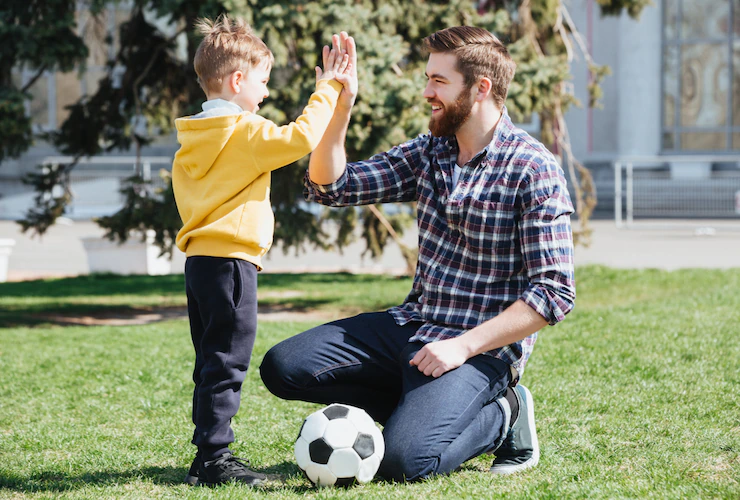Sports have long been a vehicle for teaching valuable life lessons, and fathers play a crucial role in instilling principles of fair play, sportsmanship, and teamwork in their children. Engaging in sports activities together provides an opportunity for fathers to impart important values that extend beyond the game. In this article, we will explore the significance of fatherhood in teaching fair play and teamwork through sports.
- Leading by Example: Fathers serve as role models for their children, and their behavior on and off the field greatly influences their child’s understanding of fair play and sportsmanship. By demonstrating good sportsmanship themselves, fathers can instill in their children the importance of integrity, respect for opponents, and graciousness in both victory and defeat.
- Emphasizing Effort and Improvement: Fathers can encourage their children to focus on effort and improvement rather than solely on winning. Emphasizing the value of hard work, perseverance, and personal growth helps children develop a healthy attitude towards competition. Fathers can teach their children to celebrate their own achievements and to appreciate the efforts of others, regardless of the outcome.
- Respecting Opponents and Officials: Fathers can teach their children to respect opponents and officials by emphasizing the importance of fair play and treating others with dignity and respect. Encouraging children to shake hands, congratulate opponents, and accept decisions made by officials fosters a sense of sportsmanship and fair competition.
- Teaching Teamwork and Cooperation: Sports provide an ideal platform for fathers to teach their children about teamwork and cooperation. Fathers can emphasize the significance of collaboration, communication, and supporting teammates. They can encourage their children to work together towards a common goal, fostering a sense of unity, camaraderie, and collective achievement.
- Handling Success and Failure with Grace: Fathers can teach their children how to handle both success and failure with grace and humility. Acknowledging achievements without boasting or belittling others and accepting defeat without bitterness or blame are essential qualities of good sportsmanship. Fathers can guide their children to learn from both victories and losses, using them as opportunities for growth and self-reflection.
- Resolving Conflicts Peacefully: Sports may sometimes lead to conflicts or disagreements, both on and off the field. Fathers can teach their children the importance of resolving conflicts peacefully and respectfully. Encouraging open communication, empathy, and compromise helps children develop conflict resolution skills that extend beyond sports and into other areas of life.
- Promoting Inclusion and Fairness: Fathers can promote inclusivity and fairness by encouraging their children to embrace diversity and treat all teammates and opponents with equality. Teaching children to appreciate different strengths, talents, and backgrounds cultivates a sense of respect and empathy. Fathers can emphasize the value of giving everyone a chance to participate and contribute, irrespective of their abilities or background.
- Balancing Competition and Enjoyment: Fathers can help their children strike a balance between healthy competition and enjoying the game. Emphasizing the importance of having fun, appreciating the process, and valuing the experiences gained from participating in sports helps children maintain a positive and balanced perspective on competition.
- Supporting Lifelong Participation: Fathers can encourage their children to engage in sports not only as a competitive activity but also as a lifelong pursuit for health and enjoyment. By fostering a love for sports and physical activity, fathers can promote a healthy lifestyle and lifelong participation in recreational activities.
- Reflecting on Lessons Learned: Engaging in conversations with their children about sports experiences allows fathers to reflect on the lessons learned from fair play, sportsmanship, and teamwork. These discussions provide an opportunity for fathers to reinforce positive behaviors, address challenges, and reinforce the values and principles instilled through sports participation.
Fatherhood and sportsmanship go hand in hand, providing fathers with an avenue to teach their children important life skills that extend far beyond the game. By focusing on fair play, teamwork, and respect, fathers can guide their children to become not only skilled athletes but also compassionate, responsible, and respectful individuals both on and off the field.










